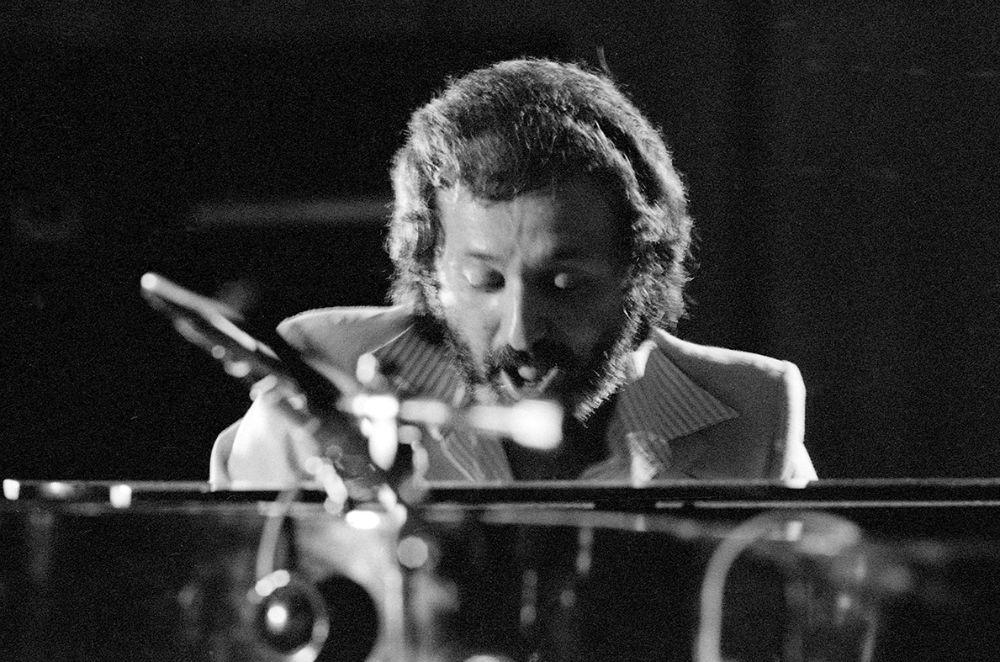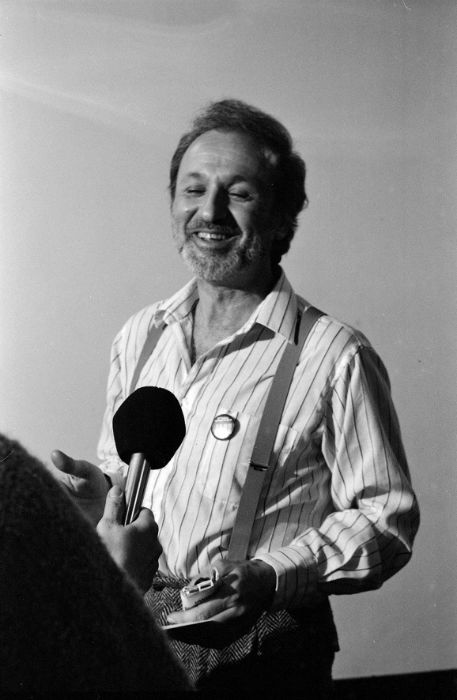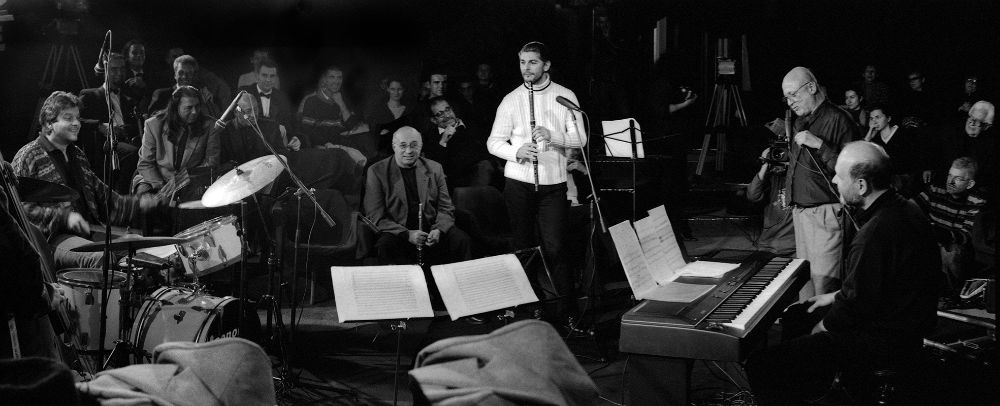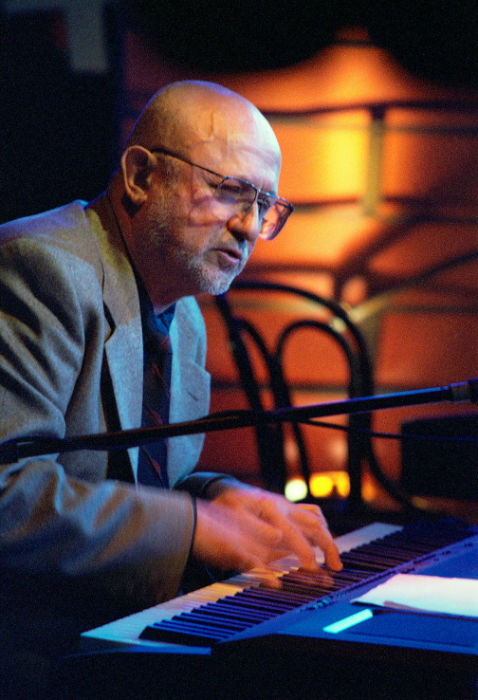|
|
Джаз фокус
документална изложба за Милчо Левиев с фотографии на Зафер Галибов.
С музиката си Милчо Левиев разширява територията на България
За мен Владигеров беше гений. Най-добрият учител, който съм имал през целия си живот.
М. Левиев
Какво ли са имали предвид музикантите от квартета Джаз-фокус, когато са приели името му, което е колкото музикално толкова и фотографско? Това ме предизвика да не търся друго име за изложбата, която ще бъде посветена на живота на Милчо Левиев. Джаз фокус е името на квартета, с който той започва своите джазови експерименти. Най-важното е да „иновираш” споделя маестрото, разказвайки за пътя на появата на джаза. Всъщност всяко негово свирене е една лекция за това, че изкуството е нещо за споделяне. Обикновено след всяка пиеса, той се обръща към колегите или към публиката и просто говори с много хумор, понякога с ирония, винаги съграждащ спонтанен радостен дух в залата.
Помня като дете как сочеха с пръст танцуващите музиката на румба, суинг и джаз на ОФ вечеринките. Това бяха жаргони прелетели от един друг прелюбопитен и непознат за нас свят. Но това бе и музиката на поробените цветнокожи, дошли от Африка заедно с музиката на протеста чрез песните на Пол Робсън, Нат Кинг Кол и спиричуълите.
А дали в началото пловдивската, а след това софийската бохема не направиха от непоправимия характер на Милчо оня търсещ дух, който сътвори от неравноделните ритми на българския фолклор изящни музикални пиеси, които покориха „глобалното село”?
Едва се бях уволнил от казармата (1967) и попаднах на концерт на Милчо Левиев в зала България. Бийт ритмите подемаха недоволния шум в залата и създаваха атмосфера на взаимност и съпричастие. Усещах трептенията на неговите емоции, това се предаваше и на моя начин на снимане. И снимката както звукът след като се случат стават притежание на всички. Неговите споделяния ме зареждаха да търся нови гледни точки, да обръщам внимание на детайлите и неуловимата спонтанност.
Да попаднеш на такъв концерт бе чудо, в него имаше странности като това да срещнеш къдравата глава на Радой Ралин и да чуеш негово провикване в залата по адрес на дискриминирането на музиката на джаза: „С музиката си, Милчо разширява територията на България”.
„20 век ще се запомни с две открития в изкуството, казва Милчо Левиев: киното и джазът.” И още една мисъл на маестрото, която винаги ме е пленявала: „…Лично аз не се съобразявам с никакви правила! Използвам това, което ми радва ухото. Според мен това е целта на музиката. Тръгнеш ли да правиш музика по някакви правила – забрави!”…
д-р Зафер Галибов.
Зафер Галибов роден в София. Завършва ВМЕИ (1975), културология във Философски факултет на СУ (2007), защитава дисертация в областта на фотографията към Института за изследване на изкуствата – БАН през 2014. Професионалните му интереси са в областта на история на българската фотография, журналистиката, сцeнични и изобразителни изкуства. Фоторедактор в списанията „Лада“ и “Наша родина“ (1978-1992), завеждащ
фотоателие „Главпроект“ (1980-1981), Малък градски театър зад канала“ (1996-1998). Работи в „Националната галерия за чуждестрaнно изкуство“ (2001-2007), а от 2007 до 2010 – в Института по математика и информатика към БАН, секция по дигитализация на научното и културно-историческо наследство, по проекта „Паметта на лицата“ – фотографията като част от културно историческото наследство. Участва в научни експедиции в Непал (1987) и в Антарктида (2000); фотографии показващи българското присъствие. Автор е на фотографски изложби в България, Литва, Израел, Финландия, Украйна, Русия, Франция, Гърция, Полша, Словения, Италия. Специални албуми: „Владимир Висоцки“ (1994), Амстердам, “Движение“(2001), София.
Получава наградата „Златно перо” за принос в областта на културата по случай 24 май (2007), сертификат на френската аукционна къща „Тажан” за оценител на произведения на изкуството, почетния плакет на кмета на Мюи, Франция, бронзов медал и сертификат на ЮНЕСКО, медал на Литовското фотографско общество и други, стипендиант е на френското правителство за фотографиране на Трансмузикалния фестивал в Рен, Франция (2001). Посланието на неговите фотографии е: Животът е кратък, хора, обичайте се!
jazz focus
documentary exhibition of Milcho Leviev with photographs of Zafer Galibov.
With his music, Milcho Leviev expands the territory of Bulgaria
Vladigerov was a genius to me. He was the best teacher I had in my whole life.
M. Leviev
What could have meant the musicians from the Focus Jazz quartet when they chose its name which is just as musical as photographic? This has provoked me not to look for another title of the exhibition which will be dedicated to the life of Milcho Leviev. Focus Jazz is the name of the quartet with which he began his jazz experiments. “The most important thing is to innovate”, the maestro tells us relating about the way jazz appeared. Actually, every playing of music of his is a lecture about the fact that art is something to share. Usually, after each of his plays, he turns to his colleagues or to the public and just speaks with a lot of humor, sometimes with irony, always creating a spontaneous spirit of joy in the hall.
I remember how they reprimanded those dancing at the music of rumba, swing and jazz at the Fatherland Front soirees. Those were jargons that had flown over to us from another world, curious and unfamiliar to us. However, this was also the music of enslaved colored people who had come from Africa together with the music of the protest through the songs of Paul Robeson, Nat King Cole and spirituals.
And were Plovdiv in the beginning and then Sofia bohemia which made from the incorrigible character of Milcho that seeking spirit which created exquisite musical plays from the odd rhythms of Bulgarian folklore that conquered the “global village”?
I was barely discharged from the army (1967) when I happened upon a concert of Milcho Leviev in Bulgaria Hall. Beat rhythms took over the XXXX noise in the hall and created an atmosphere of mutuality and empathy. I was feeling the vibrations of his emotions; it was giving into my way of shooting. Both a photo as well as sound becomes possession of all when produced. His sharing was inspiring me to look for new viewpoints, to pay attention to details and elusive spontaneity.
To happen upon such a concert was a miracle; there were such peculiarities in it such as to meet the curly hair of Radoy Ralin and to hear him shout out in the hall: “With his music, Milcho Leviev expands the territory of Bulgaria” addressing the discrimination of jazz music.
“The 20th century will be remembered with two art inventions”, says Milcho Leviev, “cinema and jazz”. And here is another thought by the maestro that has always captivated me: “I, personally, do not abide by any rules. I use that which enjoys my ear. In my opinion, this is the goal of music. If you start making music by some rules – forget about it!”
Zafer Galibov, PhD.
Zafer Galibov was born in Sofia. He graduated Engineering from Technical University, Sofia (1975), Cultural Studies from the Faculty of Philosophy of Sofia University (2007) and defended PhD thesis in photography at the Institute for Art Studies of the Bulgarian Academy of Sciences (2014). His professional interests are in the area of history of the Bulgarian photography, journalism, performing and visual arts. He worked at the National Gallery of Foreign Arts (2001-2007). He was employed by the Institute of Mathematics and Informatics of BAS, at the department for digitization of the scientific and cultural-historical heritage, from 2007 to 2010, for work on the project Memory of Faces: the photography as part of the cultural-historical heritage. He took part in scientific expeditions in Nepal (1987) and the Antarctic (2000); photographs showing the Bulgarian presence there. Zafer Galibov has made photographic exhibitions in Bulgaria, Lithuania, Israel, Finland, Ukraine, Russia, Denmark, Poland, Slovenia, Italy. Special albums: “Vladimir Vysotski” (1994, Amsterdam), “Movement” (2001).
He received the Golden Plume award for his contributions in the area of culture on the occasion of the National holiday 24 May (2007), Etude Tajan Certificate for art valuer at the auction house of the same name, Honourable Mention packet from the Mayor of Le Muy, France, Bronze medal and a certificate from UNESCO, Lithuanian Photography Society medal; a scholarship of the French government for photographing the transmusical festival in Renn, France and others. The message of his photographs is: Life is short, people, love each other!.
|









